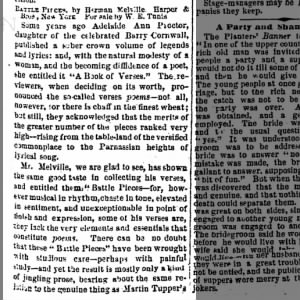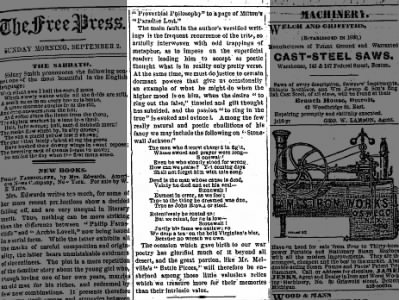 |
| Henry N. Walker 1854 portrait by Alvah Bradish via Detroit Institute of Arts |
BATTLE PIECES, by Herman Melville. Harper & Bros, New York. For sale by W. E. Tunis.
Some years ago Adelaide Ann Proctor, daughter of the celebrated Barry Cornwall, published a sober crown volume of legends and lyrics: and, with the natural modesty of a woman, and the becoming diffidence of a poet, she entitled it "A Book of Verses." The reviewers, when deciding on its worth, pronounced the so-called verses poems—not all, however, for there is chaff in the finest wheat; but still, they acknowledged that the merits of the greater number of the pieces ranked very high—rising from the table-land of the versified commonplace to the Parnassian heights of lyrical song.
Mr. Melville, we are glad to see, has shown the same good taste in collecting his verses, and entitled them, "Battle Pieces—for, however musical in rhythm, chaste in tone, elevated in sentiment, and unexceptionable in point of polish and expression, some of his verses are, they lack the very elements and essentials that constitute poems. There can be no doubt that these "Battle Pieces" have been wrought with studious care—perhaps with painful study—and yet the result is mostly only a kind of jingling prose, bearing about the same relation to the genuine thing as Martin Tupper's "Proverbial Philosophy" to a page of Milton's "Paradise Lost."
The main fault in the author's versified writings is the frequent recurrence of the trite, so artfully interwoven with odd trappings of metaphor, as to impose on the superficial reader: leading him to accept as poetic thought what is in reality only pretty verse. At the same time, we must do justice to certain dormant powers that give us occasionally an example of what he might do when the higher mood is on him, when the desire to "ring out the false," tinseled and gilt thought has subsided, and the passion "to ring in the true" is evoked and evinced. Among the few really natural and poetic ebullitions of his fancy we may include the following on "Stonewall Jackson:"
The man who fiercest charged in fight,
Whose sword and prayer were long—
Stonewall!
Even he who stoutly stood for wrong.
How can we praise? Yet coming days
Shall not forget him with this song.
Dead is the man whose cause is dead,
Vainly he died and set his seal—
Stonewall!
Earnest in error, as we feel;
True to the thing he dreamed was due,
True as John Brown or steel.
Relentlessly he routed us:
But we relent, for he is low—
Stonewall!
Justly his fame we outlaw; so
We drop a tear on the bold Virginian's bier,
Because no wreath we owe.
The occasion which gave birth to our war poetry has glorified much of it beyond all desert, and the great portion, like Mr. Melville's "Battle Pieces," will therefore be enshrined among those little valueless relics which we treasure more for their memories than their intrinsic value.



No comments:
Post a Comment